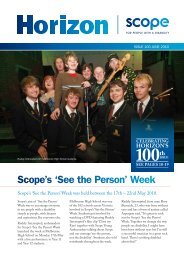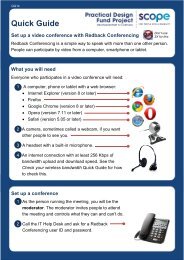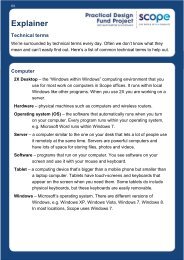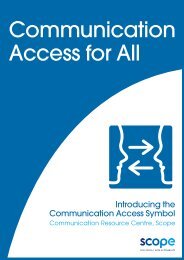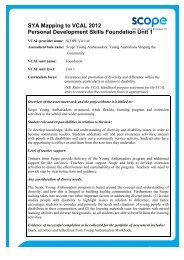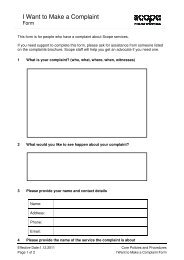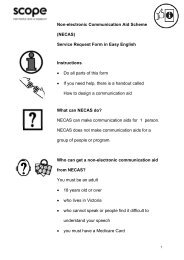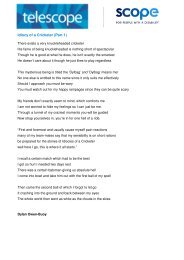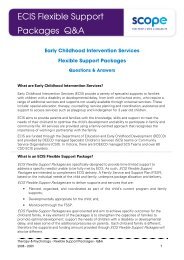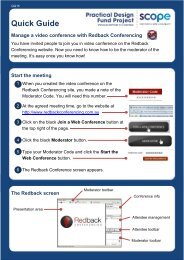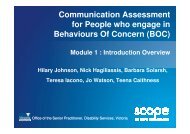Positive behaviour support Getting it right from the start
Positive behaviour support Getting it right from the start
Positive behaviour support Getting it right from the start
You also want an ePaper? Increase the reach of your titles
YUMPU automatically turns print PDFs into web optimized ePapers that Google loves.
<strong>Pos<strong>it</strong>ive</strong> <strong>behaviour</strong> <strong>support</strong>: <strong>Getting</strong> <strong>it</strong> <strong>right</strong> <strong>from</strong> <strong>the</strong> <strong>start</strong> - Facil<strong>it</strong>ators reference manual 33<br />
PowerPoint 52*<br />
PowerPoint 53<br />
*<br />
Importance of knowing <strong>the</strong> person’s preferences and abil<strong>it</strong>ies<br />
As you complete each activ<strong>it</strong>y you are building up a profile of <strong>the</strong> person you <strong>support</strong>.<br />
This information is important when developing a pos<strong>it</strong>ive <strong>behaviour</strong>al <strong>support</strong> plan.<br />
For <strong>the</strong> person you <strong>support</strong> identify <strong>the</strong> following:<br />
• How would you use PCAS to provide <strong>the</strong> <strong>right</strong> <strong>support</strong> for experiencing success?<br />
• What are <strong>the</strong> person’s likes and dislikes?<br />
• What are <strong>the</strong> person’s strengths and weaknesses<br />
• Can <strong>the</strong> person you <strong>support</strong> make choices – if so how do <strong>the</strong>y show this?<br />
• How does <strong>the</strong> person you <strong>support</strong> recognise and express <strong>the</strong>ir emotions?<br />
• What is <strong>the</strong> person’s personal<strong>it</strong>y type?<br />
• Are <strong>the</strong>y assertive?<br />
• Do <strong>the</strong>y have a high self-esteem?<br />
• Are <strong>the</strong>y motivated?<br />
• What social skills does <strong>the</strong> person have? Can <strong>the</strong>y in<strong>it</strong>iate a conversation? Take turns in a<br />
conversation? Do <strong>the</strong>y have <strong>the</strong> language to maintain a conversation?<br />
Add this information to your client profile.<br />
As a group think about <strong>the</strong> best way to collect and present this information.<br />
Ideas could include developing an ‘All about me book’ or communication passports to<br />
document <strong>the</strong> person’s preferences and abil<strong>it</strong>ies.<br />
PowerPoint 54<br />
*<br />
Human relations and sexual<strong>it</strong>y 5<br />
People w<strong>it</strong>h developmental disabil<strong>it</strong>y have <strong>the</strong> same sexual desires and needs as <strong>the</strong> rest of<br />
<strong>the</strong> commun<strong>it</strong>y. There are many myths surrounding <strong>the</strong> sexual<strong>it</strong>y of people w<strong>it</strong>h an intellectual<br />
disabil<strong>it</strong>y. They are often seen as e<strong>it</strong>her asexual or childlike and in need of protection, or<br />
conversely as oversexed and in danger of becoming promiscuous and perverted.<br />
There are differences, however, but <strong>the</strong>se have more to do w<strong>it</strong>h different life experiences and<br />
opportun<strong>it</strong>ies to learn, ra<strong>the</strong>r than <strong>the</strong> individual’s inherent sexual<strong>it</strong>y. It is by acknowledging and<br />
acting upon <strong>the</strong>se differences that people w<strong>it</strong>h a developmental disabil<strong>it</strong>y can be best assisted to<br />
develop <strong>the</strong>ir full potential.<br />
Most information about sexual<strong>it</strong>y and relationships is acquired through life experiences. People<br />
w<strong>it</strong>h a disabil<strong>it</strong>y:<br />
• tend to be overprotected by o<strong>the</strong>rs, or be lim<strong>it</strong>ed due to <strong>the</strong>ir level of disabil<strong>it</strong>y<br />
• often have difficulty learning and generalising abstract social rules and patterns of <strong>behaviour</strong> or<br />
<strong>the</strong>y learn <strong>the</strong>m in a rigid and l<strong>it</strong>eral manner<br />
• sometimes learn inappropriate <strong>behaviour</strong>s <strong>from</strong> o<strong>the</strong>rs (both w<strong>it</strong>h and w<strong>it</strong>hout disabil<strong>it</strong>ies).<br />
5. Management Guidelines, Developmental Disabil<strong>it</strong>y. Version 2(2005) pp 183 Human Relations and Sexual<strong>it</strong>y<br />
published and distributed by Therapeutic Guidelines Lim<strong>it</strong>ed. Victoria, Australia.



